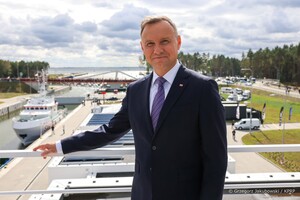It will be fully operational in 2023.

Poland on Saturday opened a channel that allows ships to sail from the Baltic Sea to its port of Elbląg, bypassing Russian territorial waters.
Elbląg in northern Poland is separated from the Baltic Sea by a thin strip of land called an isthmus. Until now, the only way through the strait near the city of Baltiyska into Russia's Kaliningrad Gulf required the permission of the Russian authorities.
A recently dug channel passes through Polish territory about five kilometers (three miles) west of the city of Krynytsia-Morska.< /p>
“We wanted to open this passage so that we would no longer require permits from a country that is not friendly to us,” Polish President Andrzej Duda said at the opening ceremony on Saturday, reports polskieradio24.pl.
In turn, the Prime Minister Minister Mateusz Morawiecki said that an open shipping channel through the Vistula Spit is a path to freedom and new opportunities. “On the 83rd anniversary of the Soviet Union's attack on Poland, we symbolically break the last bonds of our dependence on Russia,” the head of government said on social networks.
Otwierany dzisiaj kanal żeglugowy przez #MierzejaWiślana to drug freedom, new opportunities and opportunities. Zrywamy symbolicznie, w dniu 83. rocznicy napaści Związku Radzieckiego na Polskę, ostatnie peta naszej połęczny od Rosji. pic.twitter.com/2fkjrJWC6v
— Mateusz Morawiecki (@MorawieckiM) September 17, 2022
Andrzej Duda stressed that Poland cannot afford to be a dependent country. He emphasized that the opening of the Ship Canal is a great victory for everyone who understands the word “sovereignty and its meaning both internally and externally”.
The canal is currently accessible only to small boats. According to the Polish authorities, work continues and should be completed in September 2023, when the canal should be large enough to accommodate vessels up to 100 meters long and 20 meters wide.
The cost of the project is estimated at two billion zlotys ( 420,000 euros, dollars).
Related video
Environmentalists have criticized it, arguing that the canal will change the salinity level in the Vistula Bay, endangering local fauna and flora.




